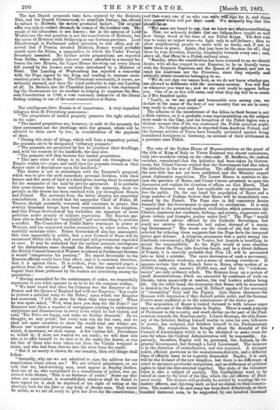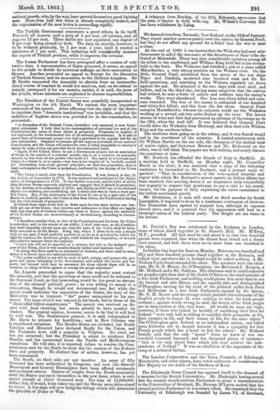The vote of the Italian House of Representatives on the
grant of the title of King of Italy to Victor Emanuel was almost unanimous, only two members voting on the otherside: M. Brofferio, the radical member, complained that the initiative had. been- taken by Govern- ment, but Count Cavour replied that the Government had also taken the initiative in the war of liberation. The official announcement of the new- title has not yet been published, and the Ministry expect great diplomatic opposition. The- Lower House is anxious to dis- cuss the question of Rome, and Count Cavour promised to open the discussion, and explain the situation of affairs on 21st March. That situation becomes less and less explicable on. any information be- fore the public. On the one hand the population of Rome and a large number of Italians believe that Rome will be immediately eva- cuated by the French. The Pope also in Hl consistory denies formally that his Government is opposed; to civilization. It is only "opposed to the pretended modern civilization which persecutes the Church, imprisons, her cardinals, bishops, and priests,, suppresses reli- gious orders, and tramples justice under. fOot." The Pope "would have received advice offered' by the Catholic Sovereigns, but could not receive the counsels and unjust demand' of a usurp- ing Government." The words are the words; of old, but the time selected for uttering them suggests that the Pope feels the temporal power past defence. A. telegram announces that a, party among the Cardinals recommend a flight to Venice, but Austria is unwilling to accept the responsibility. As the flight would at once abandon Rome, throw the Pope into Austrian handt, and be a- direct defiance of France, it is- scarcely probable that Pius 1%. will be persuaded into so fatal a mistake. The mere discussiontof such a movement, however, indicates weakness, and a sense of coming overthrow. It appears certain that the French force in Rome, often spoken of as 40,000 strong, only musters 20,000 men, and that the reinforce- ments" are only ordinary relieh. The Romans keep up a system of small demonstrations-, -which are answered- by sentences of exile on liberals, taken apparently at random, the. real leaders seldom being hit. On the other hand, the statement that Rome will be evacuated is denied in the Paris papers, and M. Billault speaks of the necessity of "reconciling" Italy and the Papacy. Gen. Goyon threatens the Romans with repression if they disturb public order, and the German Courts seem confident as to the maintenance of the status quo. The acquisition of Rome is looked forward to with intense eager nese on account of the difficulties in Naples_ There is much jealousy. of Piedmont lathe country, and much dislike on the part of the Pied- niontese towards the Bourbon party. Liborio Romano, the able Secre- ary of the Interior, finding himself unable to raise his own followers to power, has resigned, and betaken himself to his Parliamentary duties. His resignation has brought about the downfal of the Council of Lieutenancy which is to be abolished; to make room for men for whom.the Central Administration will be responsible: Ap• parently, therefore, Naples will be governed, like Ireland, by the general Government, but through a Lord Lieutenant. The measure is in the direction of centralization, and was required. A stronger police, efficient garrisons in the mountainous districts, and a different class of officials seem to be-urgently demanded. Naples, it is said, will be the Ireland of the new kingdom, but there is no difference of creed to envenomprovincial antipathies, and-no difference of political rights to bind the discontented together. The state of the volunteer force is also a subject of anxiety. The Garibaldians want to be raised at once to the level of the line, which the old officers of Pied- mont resist. The dispute will probably be settled by weeding the vo- lunteer officers, and rejecting such as. had ncr claims to their commis- sion. The number of the new army has been fixed definitively at three hundred thousand men, to be supported by one hundred thousand
national guards, who, by the way, have proved themselves good fighting men. More than half this force is. already completely trained,,and the organization of the new levies is proceeding rapidly.































 Previous page
Previous page